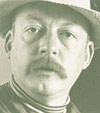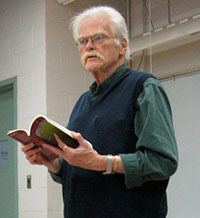
| Jacket 38 — Late 2009 | Jacket 38 Contents page | Jacket Homepage | Search Jacket |

This piece is about 5 printed pages long.
It is copyright © Robert Kelly and Jacket magazine 2009. See our [»»] Copyright notice.
The Internet address of this page is http://jacketmagazine.com/38/jwa13-kelly-robert.shtml
Back to the Jonathan Williams Contents list
1
I miss the elegance of the man, the energy of the poet, and above all the generosity that made sure publishing was publick-ing, and that brought to the commonwealth (as he might call it), the shivering needy children we are, news that concerned us and made us better—or at least (often) made us laugh.
2
The first publisher of Buckminster Fuller, Guy Davenport, Charles Olson — yes, of course they had other little books, but Jargon, with the always beautiful big format, lucid printing, visual sense of importance, endurance — Williams put their names and work out where the hungry poets and readers of the late ’50s and early ’60s could find it, did find it. We were sick to death of the gentrified poesy of that era, and the books Jonathan made us read (made the Eighth Street Bookshop stock, display) cured us, gave us a fresh wave to ride.
3
I first met him when I was a frantic reader buying on credit (they kept tally for such ravenous ones) and he was working in Ted and Eli Wilentz’s stockroom — a tall slender not very articulate young man, much callower (for all the work he’d done, his travels, his Black Mountain days, his publishing) than the upright gent I’d meet a decade later, when he came to read at Bard College. Or maybe he just didn’t like me then.
4
What am I to do with his death? Same month as Robert Owen Callahan, the San Francisco poet whose own publications reminded me a little bit of Jonathan’s, and reminds me too that the great publishers are not those who print and distribute great books but those who create a great new zone of intersection of idea, image, music, and history — a new zone in which books can be read, and our minds can be made known, shared and renewed. That’s what Jargon did, and Barney Rossett’s famous Grove Press, and Dalkey Archive, and McSweeney’s, and Black Sparrow, and some few more.
5
Jonathan knew and revered Mahler and Elgar way back when nobody played them, when academic composers dismissed them as pompous romantics. Long before the recent fashion of rediscovering tonality, Jonathan was humming Mr. Delius to me on the phone, or reminding me of anecdotes in Bruckner’s sad little life around his immense music.
6
What am I to do with the death of any friend? Any one? I have to understand that the last gift a friend gives is his death. The death is a gift. Not in the narrow, cynical sense of leaving stuff for his heirs, or leaving space for his competitors, crowing room for his rivals. Not at all — those aren’t gifts, they’re obligations or commitments or curses. No, what is a gift about the friend’s death is that he has, now, at last, given himself completely to you, in peace and thoroughness. He is yours now, to hold in mind, to be reminded by, to talk to and, who knows, be answered by. Death takes away the alterity of the friend, and brings him to you, me, in the place of sameness, where we know ourselves. And where our own death is waiting.
7
The grief I feel for him is for a man who was a friend for forty years, a voice in poetry and public discourse grandly and often dizzyingly different from anyone else in his time. The grief I propose the community of poets should feel, though, is for the loss of one of those rare writers who somehow are able to include within their own work the propagation, care, and feeding of the work of other artists. Names come to mind: Harry Crosby, Robert McAlmon, Lawrence Ferlinghetti, perhaps Cid Corman more than any —they were poets who perceived no gap — much less created one — between their own poetic productions and promoting the work of others. Not just their friends — dozens of the writers Corman brought into the world never met him, never did a thing for him, except let him bring them forward as part of the large, subtle project of his own poetics.
8
So it was with Jonathan Williams. This is the thing that’s so remarkable about him —how he embraced publishing as publicking, and what is writing in the first place but the publicking of speech? What he himself wrote, and what he published in the six decades of Jargon, the press he founded, form a kind of indissoluble figure, an ideograph of the kind Pound made us lust for and try to construct.
9
I need to state a simple gratefulness to Williams, for all he published of the great ones of the last half century — Zukofsky, Olson, and all the rest — and also, personally, for his own work. It was his Empire Finals at Verona that showed me in the late 1950s, for the very first time, that the sparse, ironic, vernacular of what would soon come to be called the New American Poetry was capable of subtle resonance, quiet rehearsals of ancient beauty, shocking clarity. Those poems of his, setting Catullus to new measures at once historically challenging and linguistically (that is, politically) consequential, showed it could be done. There was a freshness, playfulness, and sniggerless sexiness that did speak Catullus. Some years later, his In England’s Green & (A Garland and a Clyster) allowed the old stuff to show through, the Blake whose own mighty ironies awakened British pastoral into visionary energy and transpersonal love.
10
This was the same Williams who would, clear-eared and wicked-witted; make lyrical conundrums out of signs along the highway and hasty scrawls in public places — all the while listening to Elgar and Mahler. I once watched him attending to Elgar’s Second — his whole body moved to the music, stately, arms swaying, as if to some celestial, slow-motion bluegrass. Maybe Williams let the world take him too much as that wry teasing commentator, maybe he was too shy, finally, to assume the vatic role his lyric gift entitled him to swagger about in. Too much a gentleman.
11
He never failed to recognize and promote those gifts in others. In the dozens of artists he proposed to the commonwealth through Jargon publications, the famous and the obscure are in balance. Charles Olson’s Maximus in its first outing or Louis Zukofsky’s Some Time (surely one of the most beautiful books ever printed) share the bookshelf with the unknown poems of Alfred Starr Hamilton, the unlikely epic by Buckminster Fuller, the eerie photos of Lyle Bongé.
12
Williams reckoned it a privilege to discover and promote the under-attended-to, and he had his own distinct notions of what made a poet or photographer worth his efforts. None of the books made money, or only a few did, so the whole of what Jargon accomplished was to manifest an early and very handsome instance of what had by the mid 1900s become a new art form: the small press, which has now metamorphosed into the moneyless transactions of blog, zine, Web site, file-sharing, and all the other forms of free love we hasten to embrace. In Taoist measure, being small and being heard. Being small and making a difference.
13
Above all my heart keeps coming back to the generosity of Williams and how he made promoting the work of others into an ordinary and everyday part of his own work, all toward a sense of enriching the community of poets — a community that artists need as much as the commonwealth needs them: a quiet, desperate hunger often recognized only when it has been filled and those who filled it are taken away.
14
As they say in the newspapers, Jonathan is survived by the poet Thomas Meyer. They met in my house on that visit to Bard in 1969, fell in love, and lived together ever since, mostly in North Carolina (where Jonathan was born and died, hard by Black Mountain College, of which he was one of the most distinguished alumni) and in Dentdale in Cumbria. Thomas Meyer is, in my opinion, the strongest, strangest, richest poet of his generation, and has contented himself with the quiet, the mysterious domestic peace that nestles inside the wild gay life of London and New York in which they also moved. In that quiet (as Schiller famously remarked), his talent ripened.
15
Jonathan is survived too by their heart-son, Reuben Cox, the photographer. And that is apt. Williams made thousands of photos, the real things, 2 x 2 glass slides, of poets and poets’ graves and gloomy places that make us glad. And into the great zone of meaningfulness that his writing and publishing both declared, he drew also American photographers — Meatyard, and Laughlin, and Lyle Bongé — who were creating a new vulgaris eloquentia for us, the images of our condition.
16
For forty years, Jonathan Williams lived with the poet Thomas Meyer — two poets living together, sharing and abetting each other’s work. Considering how viperish poets can be, that ordinary domestic creative continuity seems itself a marvel and a demonstration of the kind of generosity I’m talking about. Meyer, who entered into that relation when he was fresh out of college, has been quietly creating an astonishing body of poetry and translations; for me, he is one of the preeminent poets of our time. It seems to me that as different as Meyer’s work is from the work of his life companion, it reflects, on an intimate but telling level, the generosity of this grand seigneur we have lost.
17
Williams and Meyer, Meyer and Williams, wise critics in days to come will analyze what I can only intuit, or foreshadow: each enriched the other’s freedom to investigate areas of extreme poetics. To study their work — which always abstained from any trace of the collaborative — would be profoundly important for a study of the psychology of the writer. (Their surface image was appealing but misleading: the portly Henry James keeping house with an even more angelic Arthur Rimbaud.)
18
They supported one another, these two poets, their work radically different, Jonathan moving steadily into the gaffes and grandeurs of American talk, roadside signs and malaprop miracles; his work moved over the years from complex music towards wise, witty, foolish one-liners, if sometimes into Deep Whimsy where I dared not follow.

Robert Kelly
Robert Kelly’s recent books are: The Book from the Sky (North Atlantic/Random House), a novel; Shame / Scham (McPherson) a collaborative memoir with Birgit Kempker; May Day (Parsifal Press) poems; Threads (First Intensity), a series of poems; and Lapis (Godine / Black Sparrow), collection of poems. Kelly lives in Annandale, New York with his wife, the translator Charlotte Mandell. He teaches in the Written Arts program at Bard College. This piece is hybridized from two valedictories written around the time of Williams’ death. One was published in The Brooklyn Rail (April 2008), and the other in the Academy of American Poets magazine American Poet (vol. 35, 2008).